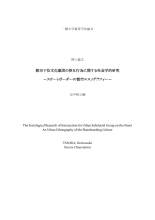11 0 0 0 IR オフ会の蜜と罠
- 著者
- 田中 研之輔
- 出版者
- 法政大学キャリアデザイン学部
- 雑誌
- キャリアデザイン学部紀要 (ISSN:13493043)
- 巻号頁・発行日
- vol.10, pp.109-130, 2013-03
Informational communicative technologies and social networking servicebased on the Internet have enabled the emergence of new sorts ofcommunities and communicative practices of everyday life. This articleaddresses the phenomenon of Internet-based group, generally referred to asonline community. Analyzed through the lens of contemporary approach byan intensive fieldwork, online community study would contribute to debatesin the literature which seeks to the epistemological positionality ofresearcher different from the qualitative method about the face-to-facegroupings traditionally thought of as communities.
9 0 0 0 IR 都市サブカルチャーズ論再考
- 著者
- 田中 研之輔
- 出版者
- 法政大学キャリアデザイン学部
- 雑誌
- 法政大学キャリアデザイン学部紀要 (ISSN:13493043)
- 巻号頁・発行日
- vol.9, pp.381-428, 2012-03
This article states the social world of youth subcultures in contemporary Japan using social exclusion theory. By examining "structurally embedded inequalities," which tend to be disregarded by post-sub cultural theory, this study will shed some light on the social contexts in which youth subcultures are created.The conceptual and theoretical frameworks that I will employ differ from those of previous works in three regards. First, my approach treats the socially excluded youth not as a group of the "new poor," but as a new collection of social actors produced as a consequence of social stratification. Second, I will focus on the epistemological turn from socio-political social exclusion where it account new poverty provoke a socially exclusive situation, to sociological social exclusion, which focuses on the process of the relationship between new poverty and social exclusion. Third, I will argue that the process of social exclusion is not only forcibly created by structural factors in the global context, but also that mundane exclusion regard to reproduce the everyday practice in local social world.
6 0 0 0 OA バークリー校現代都市民族誌の研究動向 ―複数事例比較分析と再帰的民族誌―
- 著者
- 田中 研之輔
- 出版者
- 日本都市社会学会
- 雑誌
- 日本都市社会学会年報 (ISSN:13414585)
- 巻号頁・発行日
- vol.2011, no.29, pp.143-159, 2011-09-07 (Released:2012-12-19)
- 参考文献数
- 39
Rethinking the methodology of the Chicago school of urban ethnography, this paper focuses on the research trends on the Berkeley school of contemporary urban ethnography. Berkeley school of the contemporary urban ethnography constructed five points of methodological renovation compared with the Chicago school. First, it develops the field method from single-case and single-place to single-case and multi-places [Sánchez-Jankowski, 1991 and 2008]. Furthermore, it proposes the multi-case method [Burawoy,2008] renovates the single case -multi-places method. Third, in Chicago school of urban ethnography, the duration of the field research go to from couples of years to few decades. Forth, epistemological and technical renovation that fieldworkers conduct the research style changes from the visit to the revisit. Fifth, it seeks to theoretically informed methodology. The role of theory in ethnography is not only to analyze the raw materials and to pretend to discover theory “grounded" in the field, but also to integrate the theoretical implications actively at every step in the construction of the object [Wacquant, 2002]. Finally, most importantly, it proposes the new dimensions of a reflexive model of science combined and reconstruct the positive science [Wacquant, 2002. and Burawoy, 2003].
4 0 0 0 OA 都市空間と若者の「族」文化
- 著者
- 田中 研之輔
- 出版者
- 日本スポーツ社会学会
- 雑誌
- スポーツ社会学研究 (ISSN:09192751)
- 巻号頁・発行日
- vol.11, pp.46-61,150, 2003-03-21 (Released:2011-05-30)
- 参考文献数
- 47
- 被引用文献数
- 1 2
わが国の都市空間において湧出してきた若者の「族」文化は、しばしば、地域住民や警察によって管理や排除の対象にされてきた。そこで本稿は、都市空間の利用をめぐり地域住民のまなざしや警察や警備員による管理が「ストリート」でのスケートボーダーの実践を制限し、彼らを都市広場に囲い込んでいるという90年代以降の都市的現象に注目した。具体的には、スケートボーダーとして2001年5月27日に土浦駅西口に開設した広場を利用しながら重ねてきたフィールドワークをもとに、90年代以降の「族」文化としてスケートボーダーが示しつつある「巧みな実践」の意味と意義を明らかにした。広場設置の背景には、スケートボーダーが地元のスケートボードショップ店長と署名活動を展開し、市議会議員と協力し陳情書を提出するという試みがあった。こうしたスケートボーダーによる積極的な都市広場の獲得は、同時に彼らの実践を都市広場へと囲い込むことにもなる。広場の獲得と囲い込みの中で日常的な実践を続ける彼らは、広場を自分たちが楽しめる空間に創り変えつつ、再び「ストリート」へと駆り立てられていく。彼らは地域住民や警察らによる管理や排除の圧力をかわしたり、ズラしたりしながら都市空間の「隙間」を探し求めているのである。このようなスケートボーダーの実践は、地方自治体や警察らによる「囲い込み」とそれに対する「対抗」「抵抗」図式で捉えることができない。彼らは、管理や排除に直接的に抗うのではなく、むしろ巧みに受け入れていく。本稿を通じて、筆者はスケートボーダーの日常的実践に従来の「対抗」「抵抗」図式では語りきれない彼ら一人一人の生を描き出していくとともに、「支配的なるもの」の圧力を無効化していくような「巧みな実践」を続ける彼らに新たな「連帯」の可能性を見出している。
2 0 0 0 OA 都市空間の管理と路地裏の身体文化
- 著者
- 田中 研之輔
- 出版者
- 日本都市社会学会
- 雑誌
- 日本都市社会学会年報 (ISSN:13414585)
- 巻号頁・発行日
- vol.2004, no.22, pp.155-171, 2004-09-04 (Released:2011-02-07)
- 参考文献数
- 48
- 被引用文献数
- 1
- 著者
- 田中 研之輔
- 出版者
- 関東社会学会
- 雑誌
- 年報社会学論集 (ISSN:09194363)
- 巻号頁・発行日
- vol.2004, no.17, pp.120-131, 2004-08-10 (Released:2010-04-21)
- 参考文献数
- 7
- 被引用文献数
- 1 1
This paper explores a new trend in urban subcultures, that of skateboarders seeking public space for their activities. Generally when youth subcultural groups use public spaces, station parks and urban squares, they are under the gaze of local residents or controlled by policemen and security guards. But, the case taken up in this paper progresses to a different situation. In particular, it is about the three-year long movement to acquire “Tsuchiura Station West Park” conducted by ten young skateboarders and a manager of a skateboard shop who conducted a campaign to collect signatures, presented a petition and engaged in various other activities in order to secure space for their activities. They were successful in that they were allowed to use “Tsuchiura Station West Park” for free, on the condition that this permission was granted only until the start of the urban redevelopment of the Tsuchiura station area.
1 0 0 0 IR <研究ノート>複数店舗経営者の仕事
- 著者
- 田中 研之輔 五月女 圭一
- 出版者
- 法政大学キャリアデザイン学会
- 雑誌
- 生涯学習とキャリアデザイン : 法政大学キャリアデザイン学会紀要 = Lifelong learning and career (ISSN:13493051)
- 巻号頁・発行日
- vol.14, no.2, pp.135-145, 2017-03
1 0 0 0 IR 外食ファストフード店舗の経営社会学
- 著者
- 田中 研之輔
- 出版者
- 法政大学キャリアデザイン学会
- 雑誌
- 生涯学習とキャリアデザイン : 法政大学キャリアデザイン学会紀要 = Lifelong learning and career (ISSN:13493051)
- 巻号頁・発行日
- vol.12, no.1, pp.35-55, 2014-09
On 80s, Ritzer, G pointed out the irresistibility of Mcdonalization. Mcdonalization implies a search for maximum efficiency in increasingly numerous and diverse socialsetting (Ritzer, 1996). The fast-food restaurant offers its employees a dehumanizing work setting. This paper describes the practical role and decision of manager at the fast-food Industry in Japan. In order to understand the role and decision of manager, I try to look deeper into what fast-food managers do, what roles they conduct, and how they make decisions on their shops. The raw materials on this paper from the fieldwork that I conducted and carried out during 2008-2014. This paper also refers to H. Mintzbergʼs work, managerial work constituted by the external meeting, share information, interpersonal roles, and decisional roles (Mintzberg, 2004). In doing so, this paper observe, describe and understand the practical work of management on the Fast-Food Industry.
本年度は、米国現地調査、都市民族誌の最先端の蓄積のレビュー、フィールドワークの方法論の整理、ならびに都市民族誌の翻訳作業を平行して進めてきた。現地調査では、米国不法移民の労働世界と生活世界に迫るために日雇い労働者の一人としてストリートで仕事待ちをしてきた。具体的には、カリフォルニア・サンフランシスコ北部の郊外都市の路上で日々仕事待ちを続ける米国滞在資格をもたない主にメキシコ、グアテマラ、エルサルバトル、ニカラグア出身の男性達と一緒に、平均して、一日3時間、ときには、朝9時から5時まで8時間ストリートで仕事を待ち続け、ときには、賃金交渉人として、また、自身もこれまでに、引越し手伝い、物品搬送・搬入、ペンキ塗り(補佐)、屋根清掃、庭清掃、水道業、などの日雇い労働をしてきた。このようなフィールドワークの手法は、従来の参与観察法[Participant Observation]から観察参与法[Observant Participation]への認識論的・方法論的革新として位置づけることができる。これらの調査結果をもとに、昨年度までの国内での若年滞留層の社会的排除に関する研究との日米比較へと今後展開していく。都市民族誌の現代的到達点については、初期シカゴ学派都市社会学の都市民族誌の系譜から「バークレー学派」への展開について系譜を整理してきた。方法論においても、従来のフィールドワークから「リフレクシブ・フィールドワーク」の構築に向けて認識論に関する文献を読み込んできている。さらに、現代都市民族誌の代表的著作である、ロイック・ヴァカンの『身体と魂』とイライジャ・アンダーソンの『ストリートのコード』の2作の翻訳作業も計画的に進めてきた。これらの成果は、今後国内外の学会で報告される。

